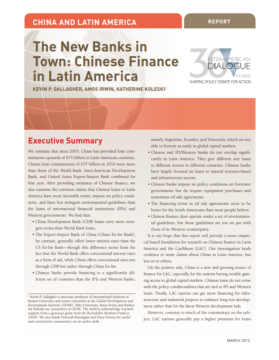Hugo Stay Home
Hugo Chavez, the Venezuelan president, has clearly been enticed by the Libyan drama, where his longtime friend and ally, Muammar al-Qaddafi, is under siege from rebel forces.
This post is also available in: Español
To address the immediate concerns surrounding Venezuela’s upcoming presidential elections on July 28, 2024, and explore possibilities for a political transition, it is essential to compare Venezuela’s current electoral conditions, outcomes, and post-election risks with those in other countries. This was the focus of the event organized by the Inter-American Dialogue’s Rule of Law Program and Chatham House.
Despite the uncertainty of the electoral outcome on July 28, 2024, Venezuelans are eager to vote, said Rebecca Bill Chavez, president and CEO of the Inter- American Dialogue. Polls suggest that 8 out of 10 Venezuelans want political change, including government officials and followers of the regime, added Luis Vidal, director of More Consulting Polling Company.
Guatemala and Nicaragua can provide some insights into addressing Venezuela’s unique situation. Despite the political and economic elite's strong influence, Guatemalan voters chose Bernardo Arévalo, who vowed to end corruption and revive democracy, even though he was not initially a leading contender, said Deborah Ullmer, regional director for Latin America and the Caribbean Programs at the National Democratic Institute. In contrast, Nicaragua’s descent into totalitarianism teaches us that context is crucial, boycotting elections is ineffective, and political transitions can be unpredictable, she added.
As learned from cases where the incumbent loses, such as Pinochet in Chile and Ortega in Nicaragua, there are certain conditions that may incentivize the ruling party to step down, including a credible vote count that is visible internationally, technical expertise within the regime and heavy weights within the ruling authority unwilling to repress to abolish the results, said Javier Corrales, Dwight W. Morrow 1895 professor and chair of Political Science at Amherst College. Also, neighboring governments have supported transitions when incumbent leaders refused to accept clear election losses, such as in Zambia in 2021, emphasized Patrick Costello, adviser to European Partnership for Democracy, Election-Watch EU, and the Kofi Annan Foundation.
Even though all eyes are on the elections, it is also important to discuss the post-election scenario. “Those in power are not going to relinquish power if they don’t know what is going to happen after,” said Tamara Taraciuk Broner, Dialogue’s Rule of Law Program director. A democratic transition would also require legal post-election incentives and guarantees for the ruling party officials, she concluded.
Please note that this event was not recorded.
Hugo Chavez, the Venezuelan president, has clearly been enticed by the Libyan drama, where his longtime friend and ally, Muammar al-Qaddafi, is under siege from rebel forces.
Estimates of the volume, composition, and characteristics of Chinese lending to the region since 2005.
Is the Venezuelan government likely to comply with the IACHR’s ruling or will it uphold the ban?
 Featured image: aboodi vesakaran / pexels
Featured image: aboodi vesakaran / pexels
